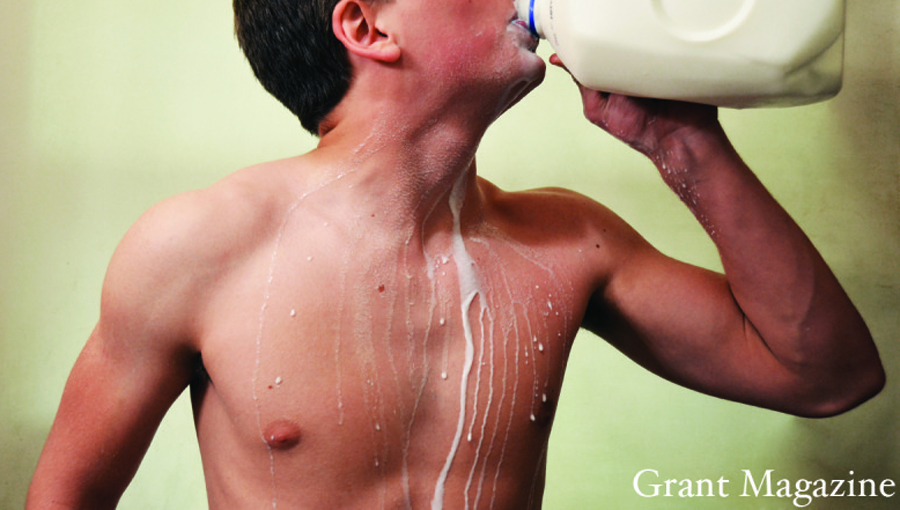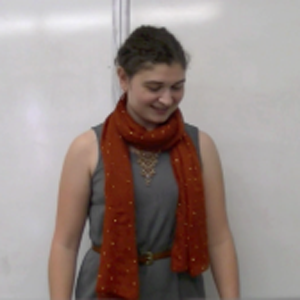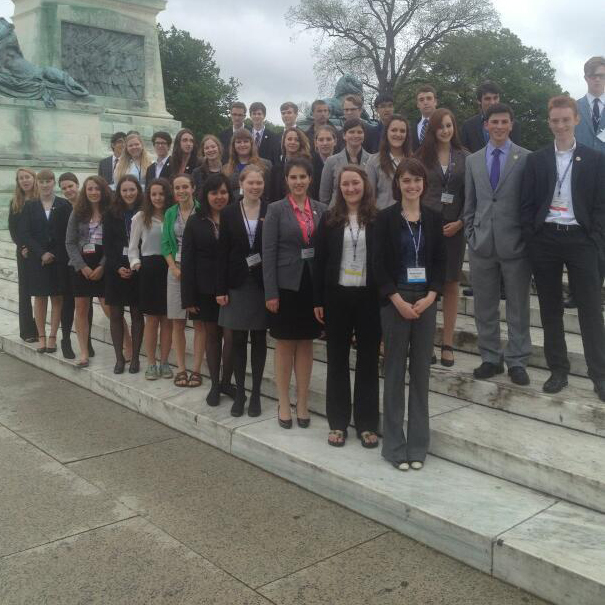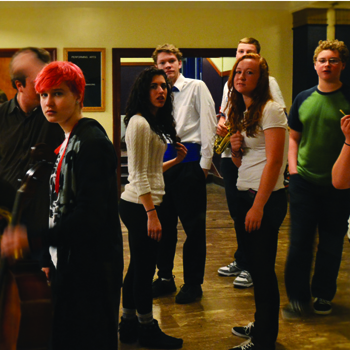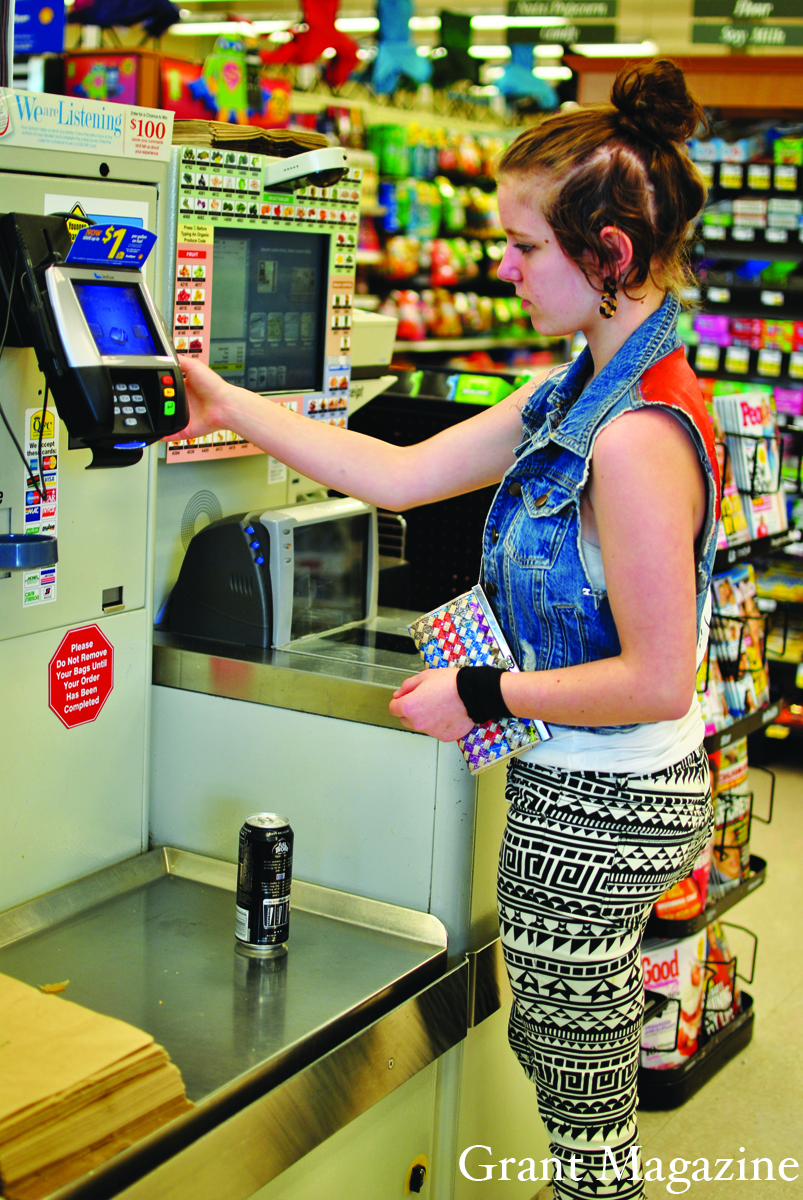It was the beginning of his junior year last year when Connor Welty and his friends watched a video of the students from Wilson High School who attempted to drink a gallon of milk in 30 minutes. After seeing it, Welty and his buddies were eager to try it themselves.
“It was my idea,” recalls Brendan Kelley. “When we decided to do it, I knew I was probably going to throw up.”
Seniors Welty, Kelley and Isaac Newell sat around on a patio with a gallon of chocolate milk in front of each of them. When it was time to begin, Welty poured himself a glass and tossed back the milk. Kelley chugged it directly from the jug.
Classmates Luke Simmons and Art O’Kelly filmed and narrated the stunt. Simmons took the video and uploaded it to YouTube, creating a time lapse of the hour. About 21 minutes in and a third of the way through his gallon of milk, Kelley threw up. Barely a minute later, Welty followed. A few minutes later, Kelley returned to the gallon and took another drink, determined to finish the challenge.
Freshman Malique Griffin heard about a similar stunt, the cinnamon challenge, after he saw countless Facebook friends posting videos of themselves trying to ingest the spice. The cinnamon challenge is proven to cause burning in the throat and vomiting, and experts say it can lead to long-term lung damage. Griffin and a friend decided to give it a shot.
He says it took him almost a minute to swallow the spoonful of cinnamon. “It was difficult once the cinnamon touched the saliva. It all stuck together: it was like trying to swallow peanut butter with nuts in it,” he remembers.
Griffin, unlike most who attempt it, was successful and made a video that he posted online in order to prove it to his peers. “I had a feeling I could do it, but I didn’t think anyone would believe me. I wanted people to be like: ‘Wow he did it, that’s really cool,’” says Griffin.
With today’s culture grounded in an obsession with celebrities and reality stars, teens will go to lengths far beyond what is safe in order to get recognition. Dangerous stunts are adapted to be imitated by amateurs making home videos, while teens are now finding a quick and accessible way to show off their humor, or what passes for it.
“A lot of this is about what we have access to and what we require to get a bigger reaction,” says clinical psychologist Susan Gendein-Marshall. “It’s been more dramatic than years back, and it may be that our culture today has been desensitized to the extent where we require more to evoke a reaction.”
In the old days, class clowns expressed themselves by face-to-face, witty humor. Today, humor manifests itself on the Internet where teenagers copy media stunts that last only briefly before moving on to the next trend. In an age of instant gratification because Smartphones are always within reach, anyone can deem themselves funny. But it hasn’t always been this way.
Take the case of Grant High School alumni Ted Smith and Andy Sessions. The members of the Class of 1983 remember the times senior year when they pulled off stunt after stunt, and the reactions they got with their humor. Once, they stood with fishing poles in hand, a cooler to their side and a dog by their feet on the roof of a local store. They let their fishing line cast into a large puddle that had collected in the uneven pavement of the parking lot. Customers passed by confused.
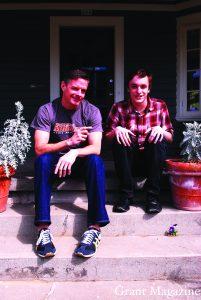 “Most people weren’t doing it, but why shouldn’t we do it? It wasn’t illegal so why wouldn’t you do it?” says Ted Smith, whose son Paul is a junior at Grant.
“Most people weren’t doing it, but why shouldn’t we do it? It wasn’t illegal so why wouldn’t you do it?” says Ted Smith, whose son Paul is a junior at Grant.
“Well, they don’t make puddles like they used to anymore,” jokes Paul Smith.
The two both chuckle with similar laughs on a recent afternoon. While Ted Smith continues to tell stories of his past, Paul Smith jumps in with extra details and asks questions. It’s like watching two comedians finish each other’s sentences. Both Ted and Paul Smith enjoy getting people to laugh, but in different ways.
“I think your sense of humor I have but morphed into weirder stuff,” says Paul Smith. He calls his current humor alternative or random humor.
Ted Smith sees it differently. He remembers 30 years ago all the memories he created with his best friend, Sessions. “It’s better to look like an idiot than to sit there and do nothing,” he says.
Class clowns were few and far between, so Smith and Sessions say they mainly only had each other for entertainment. In high school, the two would stay up to watch David Letterman on the weekends – a move that influenced a lot of their humor.
Now, Ted Smith notices how humor has evolved since he attended Grant. “I think that nutty off-the-cuff stuff that we were doing, people would be reluctant to do now because they would fear there would be these repercussions or people making fun of them,” he says. “We didn’t have to worry about that.”
Since a new form of humor has exploded on the Internet, both Ted and Paul Smith realize that humor has changed from taking risks and being funny to doing stupid stuff to get attention.
“There’s so many ideas being spread on the Internet, nothing’s really original anymore,” says Paul Smith.
Born and raised in Portland, Ted Smith was the last of his three siblings to graduate from Grant. It was common for Smith and Sessions to seek out laughs. On a regular school day, their shenanigans puzzled and entertained Grant students and teachers alike. Their jokes included rolling bowling balls down the hall or pulling their book bags behind them in matching canister vacuum cleaners.
The jokes they played back in high school continue to live with the class of 1983, and most people will never forget a particular assembly in the Grant High School auditorium. Sessions and Smith were standing onstage in their flannel pajamas. What had started as a student body elections assembly had become a three-minute presentation from two senior boys trying to lighten the mood.
At the time, Sessions and Smith had become very interested in the newest food craze – the chicken nugget. “It was a magical occasion when these things were released,” recalls Sessions.
The two had consumed enough nuggets to recognize “uniform shapes,” which led them to create “an exposé on these pesky chicken McNuggets,” says Sessions.
Sessions and Smith were offered time on stage for comedic relief between candidate speeches. Together, they kept the audience laughing while they had a secret surprise in store.
Sessions and Smith had developed photos of various nuggets, created a slide show and gave the student body a presentation on how they were made and how to properly eat them. Sessions and Smith kept the auditorium giggling throughout their presentation. Then, the projector showed a picture of a shirtless Sessions sitting on the floor with a dog placed across his lap to cover his rolled up shorts. Everyone thought he was naked.
“That slide came up and it was like the eruption of laughter,” says Sessions. To pretend it was an accident, he says: “We were like, ‘No! No, wait! How did that get in there? Next slide! Next slide!’”
 When they were done there were no consequences. “That really was the icebreaker to the assembly,” says Smith.
When they were done there were no consequences. “That really was the icebreaker to the assembly,” says Smith.
Paul Smith marvels at his dad’s exploits. “I feel like I wouldn’t be able to get away with doing stuff like that in this day and age. People are more sensitive to practical jokes,” he says.
Instead, he uses his creativity in acting and filmmaking to feed his funny side. In the 2012 Grant production of “Hairspray,” Paul Smith played Wilbur Turnblad, the main character’s goofy father. Ted Smith says he had comments from former classmates about the similarities between him and his son after they saw Paul Smith in the play.
Paul Smith doesn’t let the Internet trends affect him. His humor is either original or inspired by his favorite comedians. He grew up watching groups like Monty Python and turns to the alternative comedians such as Tim Heidecker and Eric Wareheim as his role models.
Psychologist Gendein-Marshall says trying things out in an attempt to be comedic is “part of a normal thought process as long as it’s part of growing up and figuring out who we are.”
She says teens participate in Internet trends for various reasons: attention, shock value, curiosity or as a response to peer pressure.
“It’s basically us just trying to brag that we could do it. That was the motivation behind it,” says Welty on doing the milk challenge.
Instead of succumbing to peer pressure, last year Paul Smith and his close friends Andrew Small, Riley Fortier and brother, Henry Smith, entered the 48 Hour Film Project. “At the start of the two days, you draw from a hat a genre, they announce the character and his occupation, a prop you have to use and a line of dialogue,” says Paul Smith.
Their video “Man of Iron” brought them to the finals. The film features dads of their friends, including Ted Smith. Their group Grease Trap Films has a collection of videos on YouTube and is planning on entering the 48 Hour Film Project again this year.
Social media allows pictures, videos and ideas to be spread to millions of viewers in a matter of seconds. Sometimes, testing out Internet trends is dangerous. Gendein-Marshall says: “We do experience a lot of pressure from friends to give it a try, even if it’s risky. There’s something exciting about it.”
Gendein-Marshall recognizes this kind of reckless behavior in teens. She says that challenges like these are a way of “testing out how strong or how vulnerable we are.” When teenagers see these daring acts posted on social media sites, they wonder if they could be an “exception to the rule” because they can survive something no one else could.
Griffin acknowledges: “I see people all the time who post videos and do stupid stuff just to get attention.”
But the need for this kind of attention doesn’t affect Paul Smith; he plans on pursuing his creative talents by going into either animation or film. Ted Smith says he supports his son in whatever career he chooses. “I just want Paul to be happy and doing what he wants to do,” says Ted Smith.
Gendein-Marshall acknowledges that following Internet trends seems like the fun and popular thing to do in the moment. But, she adds, “We might look back and wonder what we were thinking at the time.”



























